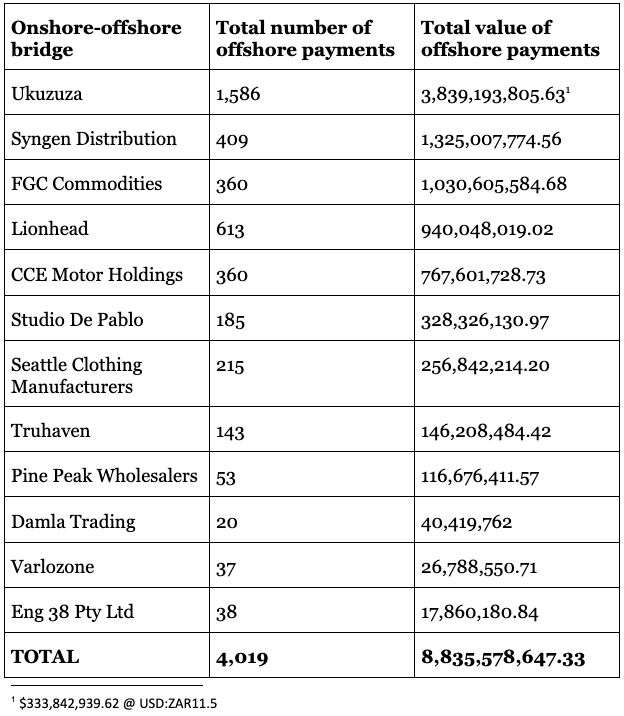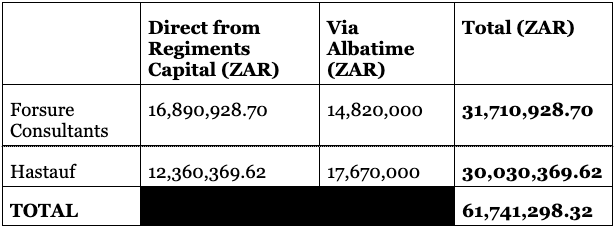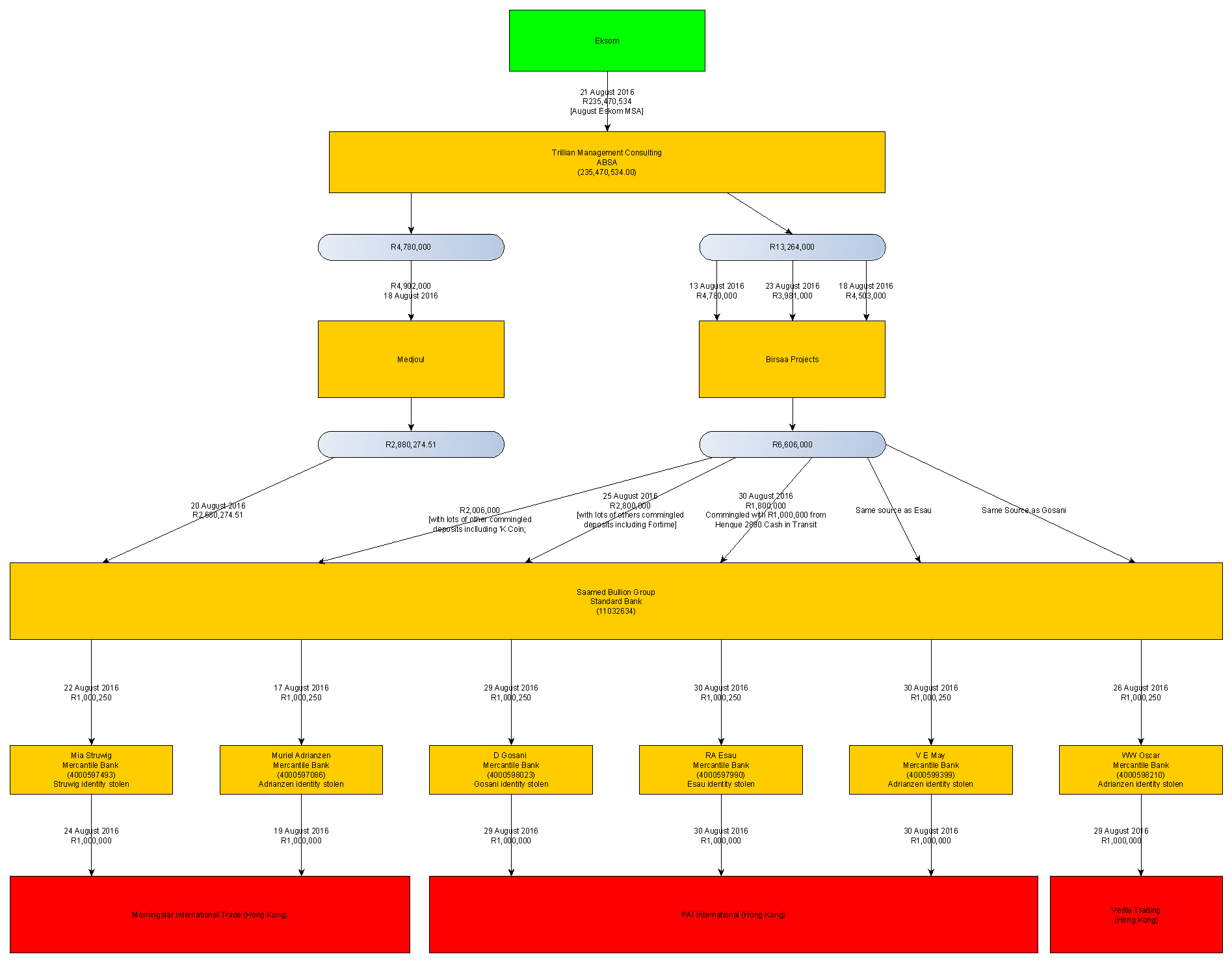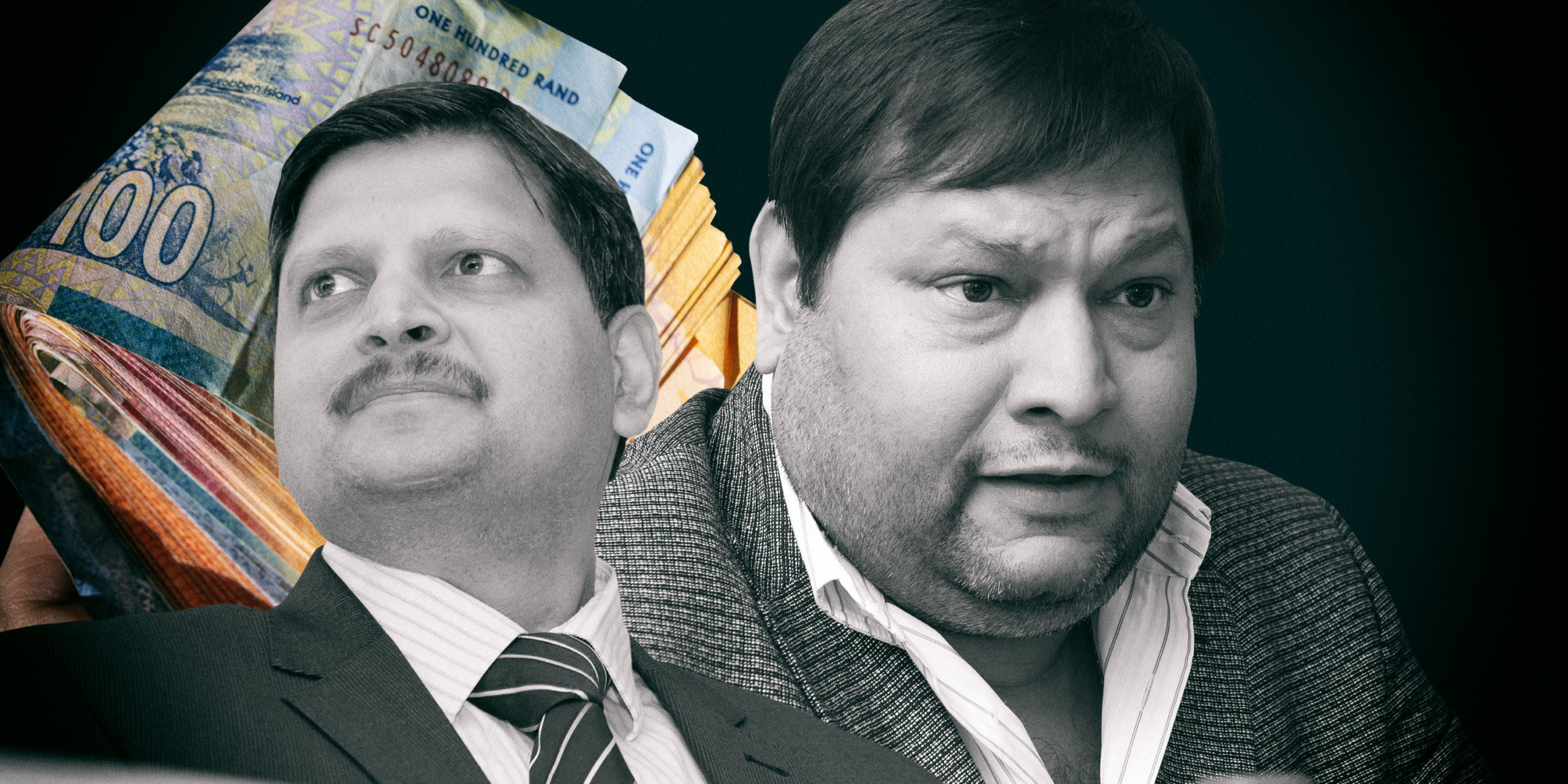Read Part One here, Part Two here and Part Three here.
First, a warning: this explainer is a bit longer than my previous entries. But these stories are so important, and so jaw-dropping, that they require some space to tell.
The scale of money laundering out of South Africa
One of the most disturbing discoveries made when following the flow of Gupta-related State Capture money was the scale of money laundering taking place in South Africa and, in particular, the amounts of money flowing out of the country into offshore laundry networks.
As I explained in the last instalment, the Gupta enterprise used laundering networks that employed onshore-offshore bridges — companies that received payments from a wide range of sources (including the Guptas) and transferred those funds into offshore accounts, mostly in Hong Kong and China.
In total, I was able to track over R387-million of Gupta enterprise State Capture money moving through 12 different onshore-offshore bridges. But the Gupta funds flowing through these accounts were only a fraction of the total moved abroad through these laundering vehicles: R8.835-billion through 4,019 transactions between 2013 and 2020.
Remember, this is the amount moved just by those companies discovered by tracing the Gupta enterprise money, not every onshore-offshore bridge there may be. I have no doubt that we only have a small and partial picture of the real extent of the problem.

The pre-existing networks used by the Guptas
Throughout the process of laundering money out of South Africa via the first-level vehicles, the Guptas piggybacked on existing criminal networks. Indeed, all of the onshore-offshore bridges used by the Guptas operated independently of the Gupta Enterprise, moving money for all and sundry.
One example of this is Chivita Trading. The Gupta enterprise paid over R144-million of State Capture money to Chivita in 2013 and 2014. Prior to this, however, Chivita was receiving a vast number of electronic and — most importantly — cash deposits. Between July 2010 and May 2013 (the Guptas started paying Chivita in May 2013), Chivita received thousands of cash and electronic deposits equal to over R354-million, almost all of which was immediately transferred out to other recipients.
Chivita distributed these funds in two rough flows, paying them onwards to either a company called Ballatore Brands or another onshore-offshore bridge called Syngen Distribution, which, as I show above, transferred R1.3-billion into offshore laundries.
Ballatore was even more active as a local laundering front, operating two FNB accounts. In the first, Ballatore received 4,106 electronic and cash deposits equal to R660-million between April 2012 and August 2013; in the second, Ballatore received 17,501 deposits equal to a truly astonishing R2.158-billion in six months between January 2014 and June 2014.
The organised crime connections: Ukuzuza, Tian Wang and the Mafia
Some of the laundering networks used by the Gupta enterprise were grisly.
In May 2015, Homix was dropped when the South African Reserve Bank (SARB) flagged payments it made directly to companies in Hong Kong. It was replaced by two stop-gap first-level laundry vehicles: Forsure Consultants and Hastauf. Together, they were paid over R61-million from State Capture contracts either from Regiments or Albatime.

Both Hastauf and Forsure Consultants transferred a portion of these funds into the accounts of IPocket Global; R14-million by Hastauf and R11.3-million by Forsure Consultants.
In 2015, SARB initiated an investigation into a company called Ukuzuza after payments it made had been flagged as suspicious. SARB discovered that Ukuzuza had been fraudulently registered against the name of an unemployed resident of Germiston.
SARB’s investigation showed that IPocket Global acted as a proxy account for Ukuzuza Trading. The owners of IPocket claimed that they had agreed to receive deposits and make payments at the instructions of the controlling mind of Ukuzuza: Tian Wang. The funds paid by Hastauf and Forsure to IPocket were thus destined for Ukuzuza, who, in turn, made the payments abroad through a currency trader called Gro Capital.
Ukuzuza was by far the largest onshore-offshore bridge identified in my investigation; as noted above, it transferred over R3-billion offshore, almost all into companies into the Hong Kong/China laundry.
In November 2015, Tian Wang was caught in a failed bribery attempt. When she found out her company was being investigated, she offered an upright SARB official, Andre Malherbe, a R5-million bribe to get him to assist with releasing funds frozen by SARB. Malherbe duly reported the offer to his superiors and to the Hawks. The Hawks then created a sting; Wang was told to deposit R4-million in a specific account and to bring a further R1.2-million to a restaurant. The Hawks immediately arrested Wang at the restaurant. Wang was subsequently successfully prosecuted for corruption and sent to jail for eight years.
In bringing the charges, then National Director of Public Prosecutions (NDPP), Shaun Abrahams, told the court that the money handled by Wang, and which the State had seized, were the proceeds of “unlawful activities including serious offences such as murder, rape, extortion, fraud and sexual offences, among others.” The Guptas were thus using the same money-laundering network as serious violent organised crime involved in the most heinous offences.
There is another astonishing part to this story. During its investigations, SARB was told that the owners of IPocket had been physically threatened by Tian Wang and one Yusuf Omarjee so that IPocket would not terminate its relationship with Wang.
Omarjee was convicted of fraud in 2013. At the time, he was additionally fingered for being the person who organised the fake passport of Samantha Lewthwaite, the so-called White Widow. Lewthwaite is one of the world’s most wanted terrorists who has been alleged to have connections to the terrorist group al-Shabaab. She travelled on a fake South African passport (under the name Natalie Faye) to Kenya in 2012, where she has been alleged to have been involved in terrorist attacks responsible for the deaths of 400 people.
The Cape gangs connection
In August 2016, six individuals transferred R1-million each into the accounts of three Hong Kong/China laundry entities: Morningstar International (who had been paid by Homix, and which led to Homix’s demise), PAI International and Vedia Trading.
These six payments were funded by State Capture money: the R235-million paid by Eskom to Trillian Management Consulting in August 2016, as the visualisation below shows.

As it emerged, none of the six individuals had any idea that the payments had been made and that accounts had been opened in their name. Their identities had all been stolen.
The true mind behind the payments was revealed when the documentation seeking approval of the transfers was interrogated. They all bore a contact email address that was a variation of sheldonbreet@gmail.com (imaginatively: sheldonbreet1@gmail.com, sheldonbreet2@gmail.com).
As Morningstar had been flagged by SARB, they launched an investigation into the payments made. They confirmed that the payments were orchestrated by Sheldon Breet (including one payment in his own name), who had to forfeit funds as a result.
In 2018, Sheldon Breet’s brother, Matthew, pled guilty to the murder of Brian Wainstein, the “steroid king” responsible for smuggling steroids into South Africa. Matthew was Wainstein’s bodyguard. Sheldon was charged and remains accused of being party to the conspiracy to murder Wainstein. Sheldon’s co-conspirators included Cheslin Adams and Fabian Cupido; the former allegedly a member of the “27s” gang and the latter allegedly associated with the Spoilt Bratz street gang.
The Guptas kept some… interesting company.
The Hong Kong/China laundry
Throughout my pieces so far I have been referring to the Hong Kong/China network. Let me explain what I’m referring to.
As I set out in my evidence in December 2020 about the capture of Transnet, Chinese rail companies paid hundreds of millions of dollars in kickbacks into the HSBC accounts of Regiments Asia and Tequesta Group, both registered in Hong Kong. These companies were controlled by Salim Essa.
As soon as Regiments Asia and Tequesta Group received these payments, they paid them out in thousands of transactions into a range of Chinese and Hong Kong companies. These companies were also paid by Morningstar International. A couple of names really stood out; Success Stand Limited, Celertus, Honourway Garment, Freedom Trading and a handful of others that received loads of payments, and which were paid by Regiments, Tequesta and Morningstar.
My investigations into these companies showed that they were little more than shelf companies in Hong Kong with no notable trading or online presence.
When the Commission asked SARB to run those names through their database of inflows and outflows, it turned out that these same companies had been paid by a lot of companies in South Africa, including a range of onshore-offshore bridges. When those bridges were reviewed, it emerged that they were all also making payments into a network of Hong Kong companies like Sanny Trading, Vic Charm Limited, Pavantex HK, Samantha Trading and a whole host of other companies.
So, a whole bunch of companies that were laundering money for all comers were making payments into the same offshore companies in Hong Kong and China, and to a number of additional companies that shared the same profile. Many of these companies were also paid by Regiments Asia, Tequesta and Morningstar. The implication was obvious: these Hong Kong companies were part of a much larger international laundry.
This was borne out by an internal investigation conducted by HSBC in April 2017. HSBC initiated the investigation following media reports about Regiments Asia and Tequesta. Their investigation was an attempt to establish the extent of HSBC’s exposure to the Gupta enterprise’s corruption.
This investigation not only supported the conclusion that the Gupta enterprise (and all of the onshore/offshore networks) was using a sophisticated laundry; it also showed that this laundry was truly vast. One investigation tracked payments into sixty accounts that had received payments from Regiments Asia and Tequesta Group. It identified over 50,339 deposits.
A word to the wise: watch this space. More information about this network and HSBC will be coming out soon.
HSBC, as is well known, has been investigated and prosecuted in relation to a large number of other money laundering scandals, including for failing to prevent the laundering of huge sums of money belonging to ultra-violent Mexican drug cartels through HSBC accounts.
The Altaf Khanani network: Drugs, Al-Qaeda and… quilts?
In tracing payments made to the Hong Kong/China laundries, the trail eventually led me and the Commission to two companies: Truhaven and Donsantel 133CC. Both of these companies had made payments into Hong Kong/China laundry vehicles like Samantha Trading, Pavantex and Derik Fashion.
At the same time, they were also making payments to a number of notable companies in Dubai. Donsantel 1333CC paid over R43-million to two companies called Aydah Trading and Seven Seas Golden Trading. Truhaven paid over R52-million to four Dubai companies between July and September 2015: Aydah Trading, Jetlink General Trading, Seven Seas Golden Trading and Wadi Al Afrah Trading LLC.
In November 2015, the US Treasury’s Office of Foreign Asset Control (OFAC) designated the Altaf Khanani Money Laundering Organisation (Khanani MLO) a transnational money laundering organisation. Altaf Khanani was once described as the world’s most wanted money launderer. The Khanani MLO laundered billions of dollars “for organised crime groups, drug trafficking organisations, and designated terrorist groups throughout the world.” Those terrorist groups include the Taliban and Al-Qaeda.
OFAC’s designation identified five key companies that the Khanani MLO used to receive and launder these criminal funds. Four of them were paid by Truhaven; two were paid by Donsantel 133CC.
Thus, there were at least two companies that were making payments to both the Hong Kong/China laundry and the Khanani MLO at the same time. But, you might be asking, what has this got to do with the Guptas?
Further digging revealed that Truhaven and Donsantel 133 were also making use of the same local laundries used by the Guptas. Key to this was a company by the name of Smart Fabrics. Smart Fabrics received payments from Truhaven; it also made outward payments to Donsantel 133CC.
Vitally, Smart Fabrics also received one payment from the Gupta enterprise first-level laundry company Fortime Consultants. Smart Fabrics also received deposits from other companies used by the Guptas to launder State Capture funds, like Rich Rewards Trading; it also made 13 outgoing payments to a company called Anchor Import and Export. Anchor Import and Export was controlled by the same man who owned and controlled laundry vehicles used to move Gupta State Capture funds abroad: Pine Peak Wholesalers, Graincor Distributors and Damla Trading.
Both Truhaven and Donsantel 133CC were investigated by SARB and subject to forfeiture orders. Truhaven’s director, Thair Gassee, is also currently facing corruption charges for trying to bribe a bank official to release funds seized by SARB.
SARB’s investigation into Donsantel 133CC revealed that the man controlling it — one Ahmed Mulla — had a long pedigree in international money laundering. Between April 2007 and May 2011, Mulla used a company called Maverick Trading 239CC, to pay over R437-million offshore to companies in Hong Kong and China.
When Maverick Trading was rumbled, he created Donsantel, through which he paid R592-million abroad between May 2013 and November 2015. When Donsantel was stopped, he opened up another company called StyleUp Fashions. StyleUp Fashions also paid money to the Hong Kong/China laundry.
Importantly, StyleUp Fashions also made a payment of R1.6-million into the account of a company called CMC Distributors. CMC Distributors was a feeder account for an onshore/offshore bridge called CCE Motor Holdings (also subject to a SARB forfeiture order). My tracking shows that the Gupta’s money laundering network paid over R1-million into CMC Distributors in April 2016.
So while the Guptas weren’t making payments via the Al Khanani network directly, they were using the same local and international networks that those companies were. Only time will tell if there are any further links between the Hong Kong/China laundry, the Al Khanani MLO, South Africa’s sprawling local network of criminal launderers and the Guptas.
Coming Up Next
In my next and final instalment, I’ll be looking at how the Guptas used their ill-gotten gains to expand their State Capture empire, looking specifically at how the Guptas used State Capture funds to buy Optimum Holdings. DM
South Africa
Part Four: The Guptas’ criminal bedfellows in South Africa and abroad

- Syngen Distribution
- Khanani MLO
- Fabian Cupido
- Cheslin Adams
- Sheldon Breet
- Yusuf Omarjee
- Andre Malherbe
- Tian Wang
- IPocket Global
- Ukuzuza
- Hastauf
- Forsure Consultants
- Shaun Abrahams
- Ballatore Brands
- Chivita Trading
- Altaf Khanani
- Brian Wainstein
- Homix
- Guptas
- Salim Essa
- Al-Qaeda
- Al-Shabaab
- Samantha Lewthwaite
- State capture




